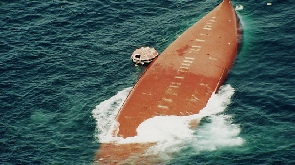The forgotten story of Africa’s Titanic tragedy that claimed nearly 2000 lives, including Ghanaians

By the time the 20th-anniversary of the Joola Disaster was marked on September 26, 2022, the majority of the families of the over 1,800 people who were killed off the coast of The Gambia when the Senegalese-owned ferry capsized, had still not had full closure.
The disaster on the MV Le Joola, although worse than the Titanic disaster, has not received as much attention globally and that has been attributed to such factors as the disinterest, first, by the Senegalese government to fully properly investigate the disaster.
Besides, as some researchers say, the American media’s coverage of Africa devotes significantly more attention to wars, corruption, starvation, and disease than to human interest or development stories in the region.
“Despite more casualties than the Titanic, to date there has been no academic literature devoted to the Joola incident, nor a comprehensive scholarly investigation into how the agricultural and fishing communities of Southern Senegal were disproportionately affected by the event,” a report by focusongeography.org said.
Of the 1,863 deaths and 64 survivors, there were 1,201 male victims (61.5%) and 682 female victims (34.9%), according to wikipedia.com.
The gender of 70 victims was unknown, while the dead passengers were believed to have come from at least 11 countries beside Senegal.
Some of the victims of the disaster, online reports say, were from Cameroon, Guinea, Ghana, Nigeria, France, Spain, Norway, Belgium, Lebanon, Switzerland, and the Netherlands.
Thought to be the second-worst non-military disaster in maritime history, the ship was plying the route from Ziguinchor in the Casamance region to the Senegalese capital, Dakar, when it ran into a violent storm, farther out to sea than it was licensed to sail.
“The whole time, there was screaming, some people were being swept away,” one of the survivors said, while another, a pregnant woman aboard the ship, said, “I thought maybe it was God’s will that I die with my unborn child.”
A young lady, who spoke in a BBC Africa documentary titled, ‘The Joola: Africa’s Titanic,’ said that “I always say that the boat is the collective coffin of our parents. It is a coffin that is left at the bottom of the ocean.”
Watch the documentary below to find out even more about the MV Joola disaster that happened in 2002:
Source: www.ghanaweb.com






